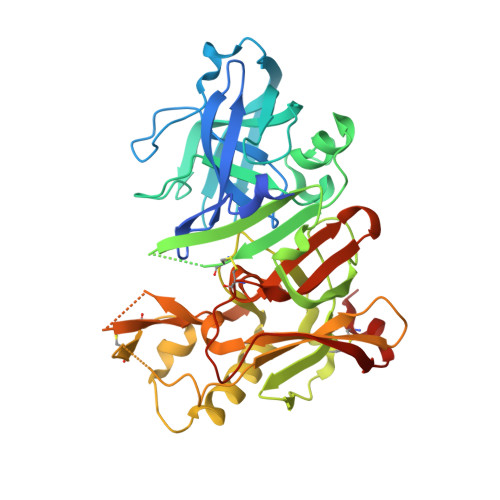Design and preparation of a potent series of hydroxyethylamine containing beta-secretase inhibitors that demonstrate robust reduction of central beta-amyloid.
Weiss, M.M., Williamson, T., Babu-Khan, S., Bartberger, M.D., Brown, J., Chen, K., Cheng, Y., Citron, M., Croghan, M.D., Dineen, T.A., Esmay, J., Graceffa, R.F., Harried, S.S., Hickman, D., Hitchcock, S.A., Horne, D.B., Huang, H., Imbeah-Ampiah, R., Judd, T., Kaller, M.R., Kreiman, C.R., La, D.S., Li, V., Lopez, P., Louie, S., Monenschein, H., Nguyen, T.T., Pennington, L.D., Rattan, C., San Miguel, T., Sickmier, E.A., Wahl, R.C., Wen, P.H., Wood, S., Xue, Q., Yang, B.H., Patel, V.F., Zhong, W.(2012) J Med Chem 55: 9009-9024
- PubMed: 22468639
- DOI: https://doi.org/10.1021/jm300119p
- Primary Citation of Related Structures:
4DH6 - PubMed Abstract:
A series of potent hydroxyethyl amine (HEA) derived inhibitors of β-site APP cleaving enzyme (BACE1) was optimized to address suboptimal pharmacokinetics and poor CNS partitioning. This work identified a series of benzodioxolane analogues that possessed improved metabolic stability and increased oral bioavailability. Subsequent efforts focused on improving CNS exposure by limiting susceptibility to Pgp-mediated efflux and identified an inhibitor which demonstrated robust and sustained reduction of CNS β-amyloid (Aβ) in Sprague-Dawley rats following oral administration.
- Department of Chemistry Research and Discovery, Amgen Inc., 360 Binney Street, Cambridge, Massachusetts 02142, United States. mmweiss@amgen.com
Organizational Affiliation:



















